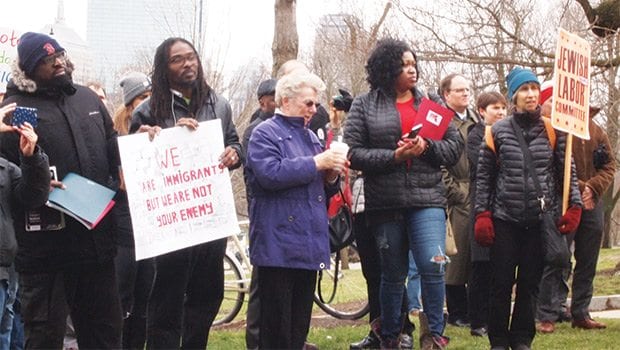MIRA Coalition draws hundreds to rally for safe communities
Activists, elected officials gather to call for greater recognition and protection of immigrants in MA

Hundreds turned out to the State House last week for the Massachusetts Immigrant and Refugee Advocacy Coalition’s advocacy day, where they rallied for passage of the Safe Communities Act and other legislation that would protect the rights of immigrants. A lineup that included politicians, civil rights activists and others said President Donald Trump’s threats to immigrants risk the financial wellbeing and sociocultural fabric of the state and nation.

State Rep. Juana Matias, a sponsor of the Safe Communities Act, spoke during MIRA’s day of action.
“We are not going to turn our backs on our friends, our fellow workers, the kids who go to school with our kids,” said Somerville Mayor Joe Curtatone, the son of Italian immigrants. “We will not violate the constitution of America and hold anyone without just cause.”
According to Liza Ryan, MIRA organizing director, approximately 1,400 people RSVP’d to the event.
Safe Communities Act
The top focus of the rally was on the Safe Communities Act, a statewide bill that extends certain prohibitions against use of local and state resources to target immigrants. These include a prohibition against state participation in creating a federal registry of individuals based on protected characteristics such as national origin or religion; local police being deputized as immigration enforcement agents; prevention of campus, local and state police participating in immigration enforcement activities based solely on the individual’s immigration status. Another provision ensures due process rights for those detained in state or local facilities on civil immigration violations.
According to information distributed by MIRA, passage of the bill would improve public health by making immigrants feel safe to seek vaccines and other care and reduce crime rates by making immigrants feel safe assisting police in investigations and reporting violence against them. Curtatone also sought to counter narratives of dangerous immigrants by pointing to study findings that state that undocumented immigrants are less likely than native-born residents to commit crimes.
Immigration issues are Massachusetts issues
Many speakers emphasized that immigrant rights issues are not the rest of the country’s problem, but something very much at play in liberal Massachusetts.
Sen. Jamie Eldridge, co-sponsor of the Safe Communities Act, noted that in Lawrence, five immigrants were arrested outside of the government office that serves immigrants seeking legal residency. State Rep. Juana Matias, the other co-sponsor, recalled a recent incident in which she participated in surprising four outstanding students with awards for exemplify their school’s values. One recipient, a twelve-year-old girl, was paralyzed with fear and begged not to have her photo taken, Matias said. She found out later that the child was the daughter of undocumented immigrants and feared recognition for her achievement would result in her parents’ deportation.
“She should have relished this milestone,” said Matias, herself the daughter of undocumented Dominican immigrants. “Instead, she was paralyzed by the thought that a single picture could tear the fabric of her family.”
Immigrants are a significant presence in the state. Massachusetts ranks eighth among the 50 states for the percentage of the populations that is foreign-born, said William F. Galvin, Secretary of the Commonwealth. One in six state residents were born outside the U.S., said Eva Millona, MIRA executive director.
Ivan Espinoza-Madrigal, executive director of the Lawyers’ Committee for Civil Rights and Economic Justice, said that shortly after Trump’s inauguration, an undocumented immigrant named Elsa came to his office. She told him that her son had been attacked at school. The principal neglected to file an incident report, telling Elsa that because of their status, her son had no rights. When Elsa said she would go to the police, the principal informed her they would not protect her.
“That is the reality we are living with in this state,” Espinoza-Madrigal said. “This is not happening in Texas, in South Carolina. This is happening in the communities you live in.”
Economic impact
Speakers also said that the Safe Communities Act would protect the economy, of which undocumented immigrants are a significant presence.
The massive deportation of undocumented immigrants envisioned by the Trump administration would cripple America financially by removing a significant section of the workforce and tax base, said Mayor Curtatone. The nation also would lose 70 percent of agricultural workers, he said.
‘They sustain us. They pay taxes,” Curtatone told the crowd. “It would be like cutting off the equivalent of Massachusetts from the U.S. economy.”
Further measures sought by MIRA aim to help immigrants utilize their full skill sets in the local economy. MIRA estimates there are 8,000 foreign-trained health professionals living in Massachusetts, but that 20 percent of them are working in lower-skilled jobs or are unemployed, due to difficulty navigating and affording local licensing requirements or lack of focused career services. One bill would establish a commission focused on reducing barriers to using health profession expertise and facilitate foreign-trained medical professionals work in rural and underserved areas.






